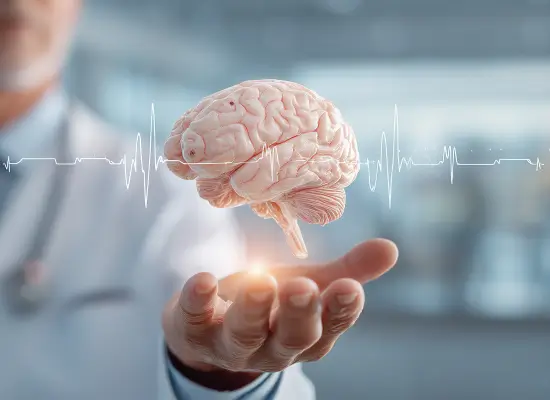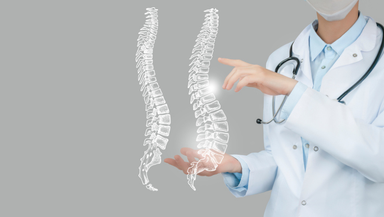Endoscopic neurosurgery in Bangalore is a minimally invasive procedure that treats brain tumours, aneurysms, and other conditions affecting the brain with endoscope-assisted surgery.

- Synopsis
- Introduction
- What is Endoscopic Brain Surgery?
- Types of Endoscopic Brain Surgery
- Why Choose Endoscopic Brain Surgery?
- Preparation for Endoscopic Brain Surgery
- Endoscopic Brain Surgery Procedure
- Recovery and Aftercare
- Risk and Complications After Endoscopic Brain Surgery
- Why Choose Gleneagles Hospitals for Endoscopic Brain Surgery?
Synopsis
Endoscopic brain tumour surgery in Bangalore at Gleneagles Hospitals is also referred to as neuroendoscopy or keyhole brain surgery. It is minimally invasive and allows surgeons to operate on the brain through the nose, mouth, or small holes in the skull. It involves less pain and surgical trauma compared to traditional brain surgeries and has a faster recovery time.
Introduction
Endoscopic Neurosurgery in Bangalore is a minimally invasive procedure that is used to treat brain tumours, aneurysms, and other conditions that are affecting the brain. Mostly, surgeons access the brain through natural openings or make small holes in the skull to access the brain. It reduces the need for large incisions that can lead to scarring and postoperative pain. This surgical procedure is particularly beneficial for patients who want to have brain surgery without any disturbance to the surrounding tissue of the brain. Choose Gleneagles Hospitals, which is one of the trusted brain surgery hospitals in Bangalore, for the best outcomes in the procedure.
What is Endoscopic Brain Surgery?
Endoscopic Brain Surgery in Bangalore is a minimally invasive surgical procedure where a thin & flexible tube with a camera & light at its end called an endoscope is inserted through the nose, mouth, or skull. The surgeon can view the brain with the endoscope and remove the tumour and affected tissues with the equipment at the end of the endoscope. This procedure can treat tumours that are hard to reach with traditional surgeries. This surgery reduces the need for large incisions and the risk of complications, with greater recovery. The surgery takes two to six hours or more, depending on the complexity of the surgery.
Types of Endoscopic Brain Surgery
Endoscopic brain tumour surgery in Bangalore is characterised by the access point of the surgery. Each procedure aims to minimise postoperative trauma and reduce hospital time with greater precision in treating brain conditions. Here are some common types of endoscopic brain surgeries:
- Endoscopic Endonasal Surgery: It uses the nose as an entry point to the brain and treats areas that are in front of the brain. It is most commonly used for pituitary tumours.
- Endoscopic Third Ventriculostomy (ETV): This is a minimally invasive endoscopic brain surgery in Banglore that treats hydrocephalus, which is a build-up of CSF (cerebrospinal fluid) in the brain. It creates a bypass for the CSF.
- Endoscopic Cranial Surgery: In this procedure, surgeons access the brain by making a few minimal holes in the skull to treat brain conditions.
Your health matters – get expert advice today.
Why Choose Endoscopic Brain Surgery?
Traditional neurosurgery in Bangalore is a difficult undertaking as it is a major surgery with quite a bit of risk and complications. Endoscopic brain surgery can treat various complex brain conditions like tumours, aneurysms, and more with precision and effectiveness. The procedure is less painful, has fewer complications, and results in a faster recovery. Here are some common cases when endoscopic brain surgery in Chennai is needed:
- Brain Tumours: Endoscopic brain surgery is primarily performed to treat brain tumours with better precision by overcoming the limitations of traditional surgery.
- Skull Base Lesions: Endoscopic brain surgery can address lesions, aneurysms, or other abnormalities in a precise manner where traditional surgery poses risks.
- Hydrocephalus: It is also used to treat conditions like hydrocephalus, where there is an increase in the cerebrospinal fluid.
Preparation for Endoscopic Brain Surgery
A thorough preparation for endoscopic brain surgery ensures a smooth procedure and a greater recovery. Here are some steps that the doctor might recommend before endoscopic brain tumour surgery in Bangalore.
- Preoperative Consultation Before anything is finalised, your neurosurgeon will perform a thorough evaluation to see whether you are fit to undergo the surgery. They will perform neurological and physical examinations and ask you about any existing medical conditions, allergies, and medications.
- Medical Tests Imaging tests, MRI or CT scan, will be performed to assess the target area. Blood tests have to be performed to check for clotting issues, infections, or other abnormalities. An ECG will be recommended to assess the heart function.
- Medication Adjustments Your surgeon will help you make adjustments in your medications, especially if you are taking blood thinners and medicines for diabetes and hypertension. Avoid non-prescription drugs and herbal supplements, as they might increase the risk of bleeding.
- Lifestyle and Dietary Restrictions Firstly, stay hydrated and maintain a balanced diet. Moreover, avoid harmful habits like smoking and alcohol consumption, as they might affect the healing process. You will need to fast for at least 6–12 hours before the surgery if you will be under general anaesthesia.
- Hospital Stay Preparation Arrange for transportation and post-surgery care at home beforehand to avoid last-minute troubles. Pack essentials like loose clothing, personal hygiene items, and necessary documents to the hospital for convenience.
- Mental and Emotional Preparation Discuss the procedure and your concerns with the surgeon to get the full picture and have a realistic mental image. You should practice relaxation techniques like deep breathing or meditation to reduce anxiety.
- Day of Surgery Remove items like jewellery, makeup, contact lenses, and nail polish before the surgery. Follow the guidelines of your surgeon about medicine and food intake before the surgery. Arrive at the hospital on time to get started with preoperative preparations.

Endoscopic Brain Surgery Procedure
Endoscopic brain surgery in Chennai is a minimally invasive procedure that is used to treat conditions like tumours, hydrocephalus, and cysts in the brain. Having detailed knowledge about endoscopic brain tumour surgery in Bangalore helps reduce anxiety about the procedure. Here is a brief overview of the endoscopic brain surgery procedure:
- Preoperative Preparation The patient is given general anaesthesia and is positioned securely on the operating table to minimise movements. A sterile field is prepared to minimise risks of infection and other complications.
- Incision and Endoscope Insertion Small incisions are made in the skull, or the nasal cavity/mouth is used as an entry point to the brain. The neurosurgeon would enter an endoscope through the area to access the affected area. The camera at the tip of the endoscope provides a clear view of the inside.
- Surgical Intervention This is an advanced procedure, so specialised instruments alongside an endoscope are required to perform the surgery effectively. Depending on the condition being treated, a surgeon may remove a tumour, drain excess cerebrospinal fluid, remove cysts or abnormal growths, and perform biopsies for diagnosis.
- Closure and Recovery Once the procedure is complete, the endoscope and the instruments are carefully removed. The small incisions are closed with sutures or surgical glue. The patient will be transferred to the recovery room for monitoring.
Recovery and Aftercare
Since Endoscopic Brain Surgery in Chennai is a minimally invasive procedure, patients recover faster than those who have undergone traditional brain surgeries. However, patients need to follow proper recovery and aftercare protocols to ensure a smooth recovery. Immediately after the operation, patients are monitored closely in the recovery room. Patients may need to stay 1-3 days at the hospital, depending on the complexity of the procedure. Neurological assessments are performed to look for any abnormalities and pain management is provided. Patients are encouraged to move around to improve circulation and prevent blood clots.
At home, patients are advised to avoid heavy lifting or bending over for at least 2-4 weeks. You will be asked to gradually resume your regular activities as per your tolerance. The surgical site needs to be clean and dry to avoid risks of infection. You should continue taking medications as prescribed by your surgeon. Eat a balanced diet and hydrate yourself to aid the recovery process, but avoid caffeine or alcohol. Sleep with the head elevated to reduce swelling.
You must visit your neurosurgeon for follow-ups 1-2 weeks after the surgery to see if there are any improvements and check for complications. Any persistent headaches, dizziness, or vision changes should be reported immediately.
Risk and Complications After Endoscopic Brain Surgery
Even though endoscopic brain tumour surgery in Bangalore is considered to be safer than traditional brain surgeries, there are still a few risks associated with the procedure. Here are some risk factors associated with endoscopic brain surgery:
- Cerebrospinal Fluid Leak: It is one of the most common complications of endoscopic neurosurgery in Bangalore, where the cerebrospinal fluid leaks to the surgical site, usually through the nose. It can lead to serious complications if not taken care of properly.
- Cranial Nerve Damage: Depending on the location of the surgery, there can be accidental damage to nerves controlling vision, eye movement, or facial sensation.
- Bleeding: Excessive bleeding before or during the surgery is a great risk that needs to be addressed with proper measures like transfusion.
- Infection: Although it is rare in endoscopic brain surgery, infection in the membranes surrounding the tissue can occur after brain surgery.
- Pituitary Gland Dysfunction: The surgery can accidentally damage the pituitary gland, which can lead to hormonal disbalance.
- Vision Changes: Although rare, a few patients have experienced temporary or permanent vision alteration after the surgery.
- Internal Carotid Artery Injury: It is an important artery located near the surgical site and injury to this would lead to serious complications.
Why Choose Gleneagles Hospitals for Endoscopic Brain Surgery?
Gleneagles Hospital is recognised as the top brain surgery hospital in Bangalore with world-class medical expertise. Our dedicated team of neurosurgeons and support staff provides personalised, patient-centric treatments for optimal outcomes. We have a dedicated support system for long-term recovery and post-op care. Here are some of the reasons Gleneagles Hospital is considered one of the best hospitals for Endoscopic Brain Surgery in Bangalore:
- Expert Surgeons: Our highly experienced neurosurgeons specialise in minimally invasive endoscopic brain surgery.
- State-of-the-Art Facilities: The hospital has advanced diagnostic centres and pathology labs for greater assessments.
- Minimally Invasive Techniques: Gleneagles Hospitals emphasise minimally invasive techniques for faster recovery.
- World-Class Infrastructure: We have advanced operating rooms, highly equipped ICUs, and tailored rehabilitation centres to provide comfort.
- High Success Rate: We had a remarkable success rate in endoscopic brain surgeries, reducing postoperative complications and risk factors.
Our Doctors
View allDr Naveen M A
HOD & Sr Consultant - Minimal Access Brain and Spine Surgery
MBBS, MS, MCh (Neuro), FMAS, FMISS (Seoul), FASS (USA), Fellow Skull base Endoscopy (USA)
Frequently Asked Questions
Endoscopic brain tumour surgery in Bangalore is minimally invasive, so it results in less postoperative trauma and fewer complications, leading to faster recovery.
Endoscopic endonasal surgery, endoscopic third ventriculostomy, and endoscopic cranial surgeries are the main types of endoscopic brain surgery in Bangalore.
Conditions like brain tumours, brain lesions, and hydrocephalus are treated with endoscopic neurosurgery in Bangalore.
Gleneagles Hospital, with its advanced technology, world-class facilities and a high success rate, is considered to be one of the best brain surgery hospitals in Bangalore
















